|
|
|
Sort Order |
|
|
|
Items / Page
|
|
|
|
|
|
|
| Srl | Item |
| 1 |
ID:
126694
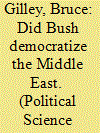

|
|
|
|
|
| Publication |
2013.
|
| Summary/Abstract |
THE WAVE OF PRO-DEMOCRACY MOVEMENTS and openings that swept the greater Middle East region in 2010-2012 caught the world by surprise. While the future of these openings is uncertain, their occurrence, as well as democratic changes in the region since 2001, are in need of explanation. What motivated and empowered the incidence of pro-democracy protest movements and regime liberalizations during this time?
|
|
|
|
|
|
|
|
|
|
|
|
|
|
|
|
| 2 |
ID:
127308


|
|
|
|
|
| Publication |
2014.
|
| Summary/Abstract |
America's Middle East policy has been a haphazard blend of hard-headed realism, idealism and dispensationalist theology. The result has not served US interests well.
|
|
|
|
|
|
|
|
|
|
|
|
|
|
|
|
| 3 |
ID:
131456
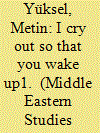

|
|
|
|
|
| Publication |
2014.
|
| Summary/Abstract |
This study focuses on the poetry of the well-known Kurdish poet Cegerxwîn (1903-84). Contextualizing Cegerxwîn's life and literary career within his specific social, political and historical circumstances, this article demonstrates the way in which Kurdish classical poetry during his madrasa education shaped Cegerxwîn's poetic creation. Furthermore, the oppression and exploitation of Kurdish peasants at the hands of tribal chiefs, sheikhs and nation-states contributed to Cegerxwîn's adoption of a Marxist and nationalist social and political standpoint. This article, attempting a closer reading of his poetry, suggests that at the essence of his poetry is found the continued use of the metaphor of awakening. Hence Cegerxwîn's poetics and politics can best be depicted as one of awakening the oppressed and subordinate social groups including the Kurds, peasants and workers from their deep sleep of oppression and exploitation. Through his Kurdish poetics and politics of awakening, it is argued, Cegerxwîn participates in the progressive political discourses of his times.
|
|
|
|
|
|
|
|
|
|
|
|
|
|
|
|
| 4 |
ID:
128433
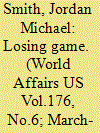

|
|
|
|
|
| Publication |
2014.
|
| Summary/Abstract |
The sentiments of Truman's State Department toward the Middle East are well documented. Hugh Wilford's engaging new book convincingly explores similar sentiments in the early CIA. One of the most famous anecdotes of the Truman administration was first revealed by presidential adviser Clark Clifford in his memoirs. Secretary of State George Marshall and his undersecretary were called into the Oval Office to debate with Clifford the merits of recognizing Israel. After Clifford argued in favor of Israel, Marshall, whom Winston Churchill called the "Organizer of Victory" for his role as army secretary during World War II, made what Clifford called "the most remarkable threat I have ever heard anyone make directly to a president." Said Marshall to Truman: "If you follow Clifford's advice and if I were to vote in the election, I would vote against you. Marshall's stunning comment reflected the viewpoint of "almost every member of the brilliant and now legendary group of presidential advisers, later referred to as the Wise Men, who were then in the process of creating a postwar foreign policy that would endure for more than forty years," recalled Clifford. Those advisers included such luminaries as George Kennan, Dean Acheson, Dean Rusk, and Charles Bohlen. They were later dubbed the "Arabists" because they believed that the Arabs could be allied with America after World War II-and should be courted instead of Israel.
|
|
|
|
|
|
|
|
|
|
|
|
|
|
|
|
| 5 |
ID:
128136


|
|
|
|
|
| Publication |
2013.
|
| Summary/Abstract |
On November 26, 2011 Glenn Grenwald wrote an article in Salon magazine, a widely read American online publication, about a vast neoconservative plan to re-engineer the entire Middle East and North Africa region, in the aftermath of the collapse of the Soviet Union and the Warsaw pact in the early 1990s.
|
|
|
|
|
|
|
|
|
|
|
|
|
|
|
|
| 6 |
ID:
132012
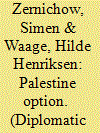

|
|
|
|
|
| Publication |
2014.
|
| Summary/Abstract |
Were the Palestinians anything more than simply a refugee problem? Since the creation of the State of Israel in 1948, the USA had pretty much ignored this haunting question. However, as the Palestinian guerrillas' wide-ranging armed struggle seemed to be approaching a climax in 1970, U.S. policy makers were forced to reassess whether they might also need to view the Palestinian issue as a political problem. In April to May of that year, U.S. State Department officials began to doubt whether the Jordanian regime would survive the civil war then brewing in that country. In response, a strategy paper examining the possibility of a joint Jordanian-Israeli-Palestinian settlement-a policy that would come to be known as the "Palestine" or "Palestinian option"-was developed within the U.S. State Department. Between October and December 1970, the National Security Council discussed various versions of this strategy paper. At the same time, members of the main Palestinian guerrilla organization, Fatah, sent messages to the Americans indicating that they might be willing to enter into negotiations. Why, then, did these efforts fail to bring about a change in U.S. policy toward the Palestinians?
|
|
|
|
|
|
|
|
|
|
|
|
|
|
|
|
| 7 |
ID:
129105
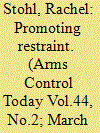

|
|
|
|
|
| Publication |
2014.
|
| Summary/Abstract |
On January 15, 2014, the United States released a document describing its new policy governing transfers of conventional weapons. The policy revision was long overdue, as the new publicly released document, Presidential Policy Directive 27 (PPD-27),[1] replaced a classified directive that came out in 1995.[2] The world has changed dramatically since the end of the Cold War. Until the release of the new policy document, however, the United States had been using policy guidance rooted in the geopolitical challenges created by the fall of the Soviet Union in making its arms transfer decisions and in outlining policy priorities and approaches to the global arms trade. According to a White House summary, a multi-year interval review of U.S. arms export policy "concluded that the 1995 conventional arms transfer policy was effective but needed to be updated to address 21st century national security and foreign policy objectives."[3] Thus, the new U.S. policy more accurately reflects the reality of U.S. arms transfers today. The Obama administration began its review when it came into office, but U.S. officials have said the impetus to finish the review came from events during the Arab Spring, when canisters of tear gas emblazoned with "Made in the USA" dominated pictures of the uprisings in Cairo's Tahrir Square. Questions surrounding U.S. arms sales to Egypt and other Arab countries led to increased scrutiny over the process of determining whether to transfer conventional arms and whether arms sales in fact led to U.S. influence over the recipient.
|
|
|
|
|
|
|
|
|
|
|
|
|
|
|
|
| 8 |
ID:
131453
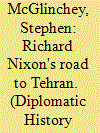

|
|
|
|
|
| Publication |
2013.
|
| Summary/Abstract |
By the time of Richard Nixon's arrival in office Iran had already become America's single largest arms purchaser. This was the result of an evolutionary process that had been underway for two decades. Nixon did not just change that evolutionary pattern of arms sales with Iran, he completely revised U.S. thinking on Iran's regional role. By the end of his first term in office, Nixon had leveraged U.S. Middle Eastern regional policy primarily around the focal point of a militarily strong, pro-U.S. Iran. In concert, the shah was encouraged to begin an unprecedented military spending spree. Consequently, in mid-1972 following a meeting of the two leaders in Tehran, Iranian annual purchases went, virtually overnight, from being measured in the tens of millions to being measured in the multi-billions. Tracing the complex evolution toward that meeting, and the accompanying policy shifts, form an underappreciated part of Cold War history.
|
|
|
|
|
|
|
|
|
|
|
|
|
|
|
|
| 9 |
ID:
096093
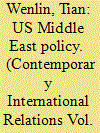

|
|
|
|
|
| Publication |
2010.
|
| Summary/Abstract |
After the 9/11 incident, the United States further shifted its strategic focus on the Middle East. This article analyzes the strategic dilemma faced by the US in he Middle East and the origins of its Middle East strategy. It uses and historical perspective by comparing former strategies with current policy.
|
|
|
|
|
|
|
|
|
|
|
|
|
|
|
|
| 10 |
ID:
132110
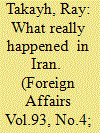

|
|
|
|
|
| Publication |
2014.
|
| Summary/Abstract |
Back in 2009, during his heavily promoted Cairo speech on American relations with the Muslim world, U.S. President Barack Obama noted, in passing, that "in the middle of the Cold War, the United States played a role in the overthrow of a democratically elected Iranian government." Obama was referring to the 1953 coup that toppled Iranian Prime Minister Mohammad Mosaddeq and consolidated the rule of the shah, Mohammad Reza Pahlavi. Obama would go on to remind his audience that Iran had also committed its share of misdeeds against Americans. But he clearly intended his allusion to Washington's role in the coup as a concession -- a public acknowledgment that the United States shared some of the blame for its long-simmering conflict with the Islamic Republic.
|
|
|
|
|
|
|
|
|
|
|
|
|
|
|
|
|
|
|
|
|